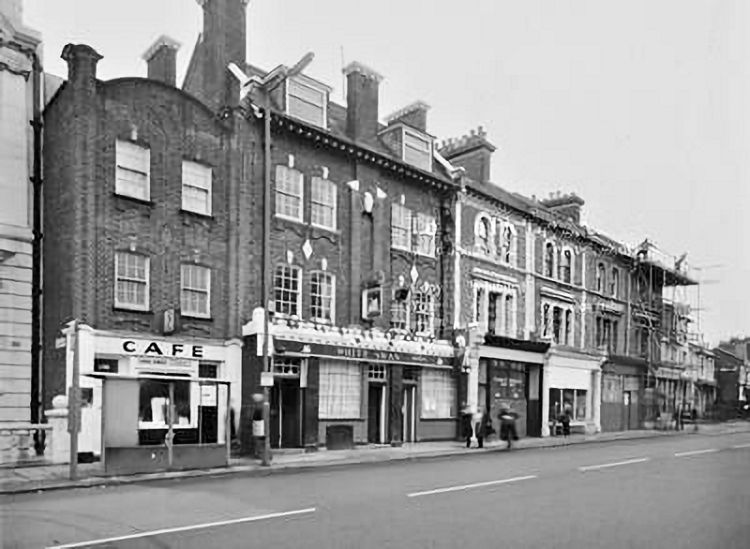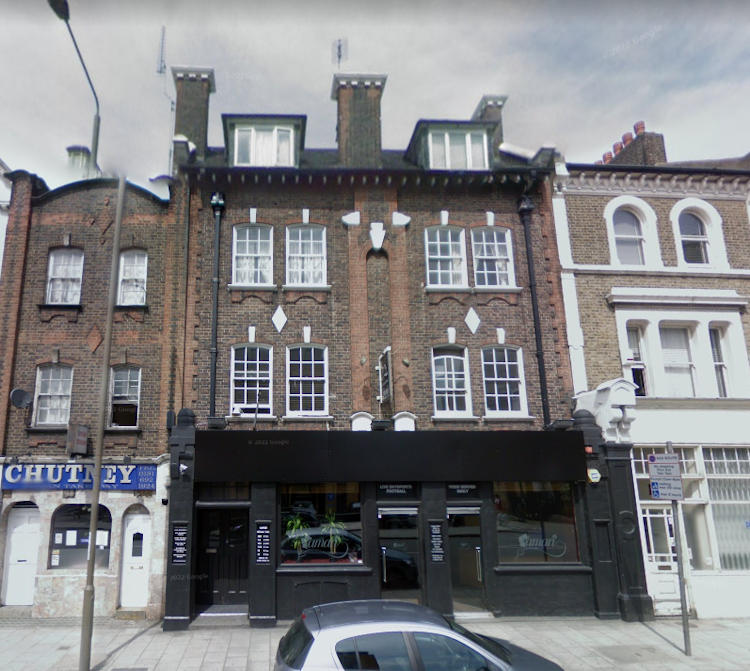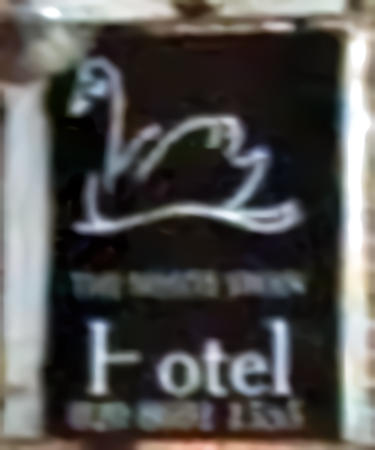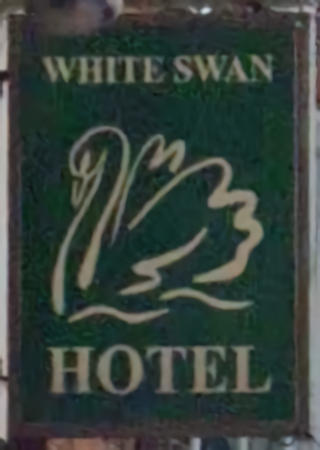|
From the Kentish Gazette, 13 May 1845.
MURDER AT GREENWICH.
On Monday a jury, consisting of seventeen of the principal
inhabitants was empanelled before Mr. C. J. Carttar, the coroner,
at the "White Swan," Blackheath-road, to investigate the
circumstances attending the death of Robert Harry Ffinch (the infant
son of John Drake Ffinch, Esq., of the firm of Smith and Ffinch,
solicitors, Croom's-hill, Greenwich), whose body was found dead, with
his head nearly separated therefrom, on Sunday morning.
The jury having been sworn, the Coroner stated to them all the
circumstances which had come to be knowledge, and then proceeded to
view the body, which lay extended in the cot in which the deed had
been perpetrated.
Martha Brixey, the wretched girl who stands charged with the murder
of the deceased, was then brought into the room in custody of the
police, accompanied by her mother and the female keeper who had been
appointed to attend her in the police cell in order to prevent her
from committing violence upon her own parson. She was led to a chair
in a pitiable slate of weakness. She is of slight stature, of pretty
features, and looked exceedingly pale.
The first witness called was Sarah May, upper nurse in the family of
deceased's father. She deposed that she had been two years in Mr
Ffinch's family. The deceased was nine months old. The prisoner,
Martha Brixey, was under nurse. Witness saw the infant last at a
quarter before ten on Sunday morning. She put him into his cot and
left him sleeping at that time. The prisoner was in the next room
five minutes before she left the nursery. The prisoner said, "Do you
think Mrs. Ffinch will forgive me; will she let me stop?" Witness
replied no. Mrs. F, had candidly told her she would not. She then
advised the prisoner to be quiet, as it would be much better for
her. She had been worrying her mistress on Saturday, begging her to
forgive her and let her remain. Mrs. Ffinch had said “No positively.
She had seen a person that would suit, and could retain her services
no longer. To all this the prisoner made no answer. On Sunday
morning, at breakfast, the prisoner said she wondered if Mrs. F. had
seen the new maid. Witness remarked that she would call on Monday.
This conversation took place while making the bed. Witness then left
the room and went down to the kitchen, taking one of the younger
children with her. She there left the children with the cook and
housemaid, and went into the back yard, and while there she heard
loud screams. She immediately ran into the house and wont up into
the nursery, from whence the cries came. All the children were
crying very much, and Mrs. Ffinch was in a frantic state. Mr. Ffinch
was preventing the prisoner from going up stairs. The cook had gone
up stairs. Mr. Trail and Mrs. Ffinch were below in the hall. Witness
found the child lying on its back, and the head nearly off. She had
left it lying asleep on its side. On looking round she saw an ivory
handled table knife, covered with blood. The children were at this
time all below crying in the hall. About seven minutes elapsed
during all this. The knife used was much sharper than others. The
prisoner had always behaved very well towards the children. The
prisoner had behaved very strange about a gown (mourning,) which her
mistress had given her, and she was going to leave partly on that
account, about three works ago. She complained much about the dress
not fitting her. She subsequently cut the body from the skirt, in
the nursery, and burnt it. Witness told her she ought to be ashamed
of herself, and that she would tell Mrs. Ffinch on her return home.
The prisoner was in a great passion when she burnt the body of the
dress, but became quiet afterwards and seemed satisfied with what
she had done. Witness repeatedly advised her not to burn it, as it
fitted her. She was most determined, and said "She wished the
dressmaker had been at the d—l before she had made the gown.’" She
further said, she wished to leave and get a housemaid's place. Mr.
and Mrs. Ffinch were exceedingly kind to her and to all the
servants. Thinks it was mere pride, as the dress fitted well. All
the servants had mourning alike. Prisoner bought a new body for 6s,
and had it made up, she said she did not like it, and took it to a
pawnbroker's. She told her mistress that she had sold it, but could
get it again. She was ordered to fetch it, and did so, when her
mistress told her if she would conduct herself properly, she would
forgive her; but if anything more about the dress occurred, she must
go. She was sent out with the children on Friday, aud kept them
without their dinner. Mrs. Ffinch, on her return, remonstrated with
her, and told her she should wriite to her mother to fetch her away,
and did so. Prisouer told Mrs. F. that she wished to see her master,
to induce him to retain her, and Mrs. F. replied that her mind was
made up, and that Mr. F. would not interfere in her domestic
arrangements. The prisoner has appeared unhappy during the last
three weeks, and has taken medicine twice a day for three weeks or a
mouth. Complained of her head at times, but had been better since
taking the medicine. She was always treated with the greatest
kindness. Mrs. Ffinch told her that she would give her a character,
and that she was at liberty to come and see the children and the
servants as often as she pleased.
James Trail, Esq., (police magistrate), deposed that he called at
Mr. Ffinch’s house at a quarter before 10 on Sunday morning, and
went into the drawing-room. He was let in by the housemaid. Mr. and
Mrs. Ffinch came to him in a minute or so afterwards, and they
conversed together from five to ten minutes, when the door opened,
and the prisoner entered. She presented an unusual and distracted
appearance, and immediately exclaimed, "What have I done? What lave
I done?" many times over; and, again, "What will become of me? What
will become of me? I am a murderer, I have killed the baby." Mr.
Ffinch demanded to know what had happened to the child, and rushed
from the room. Witness's impression was at the moment that some
dreadful accident had happened, and that the child had been dropped
out of the window, he then followed Mr. Ffinch up in the nursery,
and saw Mr. Ffinch coming down. Mr. Ffinch returned, and drew his
attention to the child's cot, where the deceased lay with his head
nearly severed from his body. On leaving the room he met the
prisoner, and ordered her down again. He then went into the drawing
room to Mrs. Ffinch. Witness next saw the prisouer in Mr. Ffinch's
dressing-room, apparently in great distress, saying, "What will
become of me— what will become of me?" Witness said, "You are a poor
miserable wretch," and she said, "Will God pardon me?'' He held her
hands, and got the servants to assist until he could procure a
police constable and prevent further violence. The whole family had
at this time assembled in a most distracted state of mind. The
prisoner again addressed deceased's parents, and implored their
forgiveness.
Elizabeth Middlewich, housemaid, said she saw the upper housemaid
washing the deceased at a quarter past nine o'clock on Sunday
morning. Witness went down stairs, and the nurse followed about ten
o'clock with the youngest child but one, and left it in the kitchen
with the others in care of the cook. The nurse then went into the
yard. Mr. and Mrs. Ffinch and Mr. Trail were in the parlour at 20
minutes to 10. The prisoner came into the kitchen shortly after
nurse, and went into the pantry. Witness followed, and asked her
what she wanted. She took a table knife out of the box and said she
was going up stairs with it to cut a pencil for Miss Mary. Witness
said, "Better take a dessert-knife," and she did so, saying that the
larger one would do to cut the children’s bread and butter in the
afternoon. She felt the edge of the large knife to see if it was
sharp. Prisoner stood a minute in the passage looking at the child
standing by the cook, and then went up stairs. In three minutes
after she heard a loud screaming as if from the passage. She ran up,
and met Mr. Ffinch coming down, and the prisoner said, "Good God, I
have cut the dear baby's throat!" She (witness) went into the room,
and saw deceased and the bloody knife lying down. The prisoner said
she was miserable about being discharged.
Caroline Priest, cook to Mr. Ffinch, corroborated the evidence of
the nurse and housemaid as to the taking away the knives, &c.
Serjeant George Goode, 2 R, deposed that he was sent for by Mr.
Ffinch, and produced the knife with which the murder was committed.
He saw the prisoner at the station house, who said, "Oh, Mr. Goode,
I hope God will forgive me." He received the knife from the hands of
Dr. Sutton.
Serjeant Booth, 21 R. deposed that the prisoner, when brought to the
station, had blood on the back of her hands.
A note was here handed to the coroner, written by the prisoner, and
left by a policeman at the house of Mr. Ffinch yesterday morning. It
ran thus:—
"Dear May—Pray send a gown, &c., and pray to God for the wickedness
I have done. I do pray sincerely. "Martha Brixey."
John Sutton, Esq., M.D., deposed that he was called in immediately
after the melancholy event, and found the child's head had nearly
been separated from the body. Great force must have been used in
doing it, and death must have been instantaneous.
The Coroner inquired of the wretched woman if she wished to ask the
witnesses any questions, to which she replied in the negative. He
then asked her if she had heard all that had been said, and after
cautioning her, desired to know if she had anything to say as to the
melancholy affair.
The prisoner replied that she had nothing to say, but hoped he would
plead all he could in her behalf.
The Coroner then summed up, remarking that there could not be the
slightest doubt as to the cause of death; and as regarded the sanity
or insanity of the prisoner at the time of the commission of the
dreadful act that must be the subject of inquiry by a higher
tribunal.
The Jury consulted together about five minutes, and then returned a
verdict of Wilful Murder against Martha Brixey.
The prisoner was in a deplorable state during the investigation,
attended by her mother and a female keeper.
The Coroner handed over his warrant of committal to Serjeant Goode.
2 R, who conveyed the prisoner in a hired carriage to Newgate for
trial.
|



